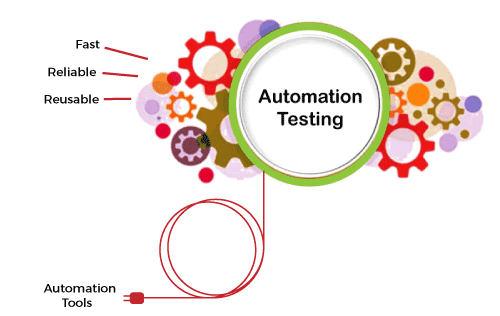Advantages of Automation TestingIn this article, we are going to discuss the advantages of Automation testing. This post will be very helpful to you and give you complete information about the benefits of automation testing. So, without any delay, let's start the topic. Before going to the benefits, let's first see a brief description of automation testing. Automation testingAutomation testing uses some specific tools to execute the test scripts without any human interference. In automation testing, the test automation engineer writes the test scripts or uses the automation testing tools to execute the application. Whereas, in manual testing, the test engineer write test cases and implement the software based on written test cases. It is the most acceptable way to enhance the efficiency, productivity, and test coverage of Software testing. 
In automation testing, test engineers can execute repeated tasks, whereas repeated execution of tasks in manual testing is a tedious process. With the help of an automation testing tool, we can easily approach the test data, handle the test implementation, and compares the actual output against the expected outcome. Automation testing mainly focuses on reducing manual human activity with devices or systems. It increases the efficiency, effectiveness, and coverage of software testing. It saves time and effort. For the proper implementation of automation testing, there is a requirement of considerable money and investment. There are various automation testing tools available in the market, such as - selenium, QTP, Watir, Testim, etc. Now, let's discuss the benefits of Automation testing. Benefits of automation testing
The advantages of automation testing are given as follows - Saves timeAutomating the testing process helps the testing team to use less time to validate newly created features. For instance, in manual testing, there is a need to write thousand test cases for a calculator application, but automation makes the process much faster. Productivity improvementAs during execution, automation tests do not require human intervention, so testing an application can be done late at night, and we can get the results next morning. Software developers and testers require less time on automation testing. Accuracy improvementIn manual testing, there is a chance of mistakes whether you are an experienced testing engineer. The chances of errors may increase when testing a complex use case. But Automation testing reduces the chances of errors. There is good accuracy, as we will get the same result each time on performing the same test cases. Test suite reusabilityWe can reuse the test scripts in automation testing, and we don't need to write the new test scripts again and again. These test cases can be used in various ways, as they are reusable. Reusability helps to reduce the cost and also eliminate the chances of human error. Ability to test on various platformsAutomation testing allows the user to test the application on different web browsers and operating systems. Running tests 24/7In automation testing, we can start the testing process from anywhere in the world and anytime we want. It can also be done remotely if we don't have many approaches or the option to purchase them. Early bug detectionBy automation testing, it is easy to detect critical bugs in the initial phases of software development. It reduces the cost and helps us to spend fewer working hours to fix such problems. It increases the efficiency of the team. Less human resourcesAutomation testing requires fewer people to perform a tedious manual test. To implement the automation test script, we need a test automation engineer who can write the test scripts to automate our tests. Reduce the expensesAutomation testing is less expensive, as once the test scripts have been built, we can reuse them at any time without any extra cost. While manual testing is more expensive than automation, with manual monitoring, it is typical to execute experiments repeatedly. Scalability of test casesIn manual testing, we require the involvement of the number of people and number of hours to scale up a project. Whereas the scalability of automation testing is higher, we need adding of test executors to the testing framework. ConsistencyCompared to manual testing, automation testing is more consistent and way faster than executing the regular monotonous tests that cannot be missed but may cause faults when tested manually. Fast development and deliveryAutomated tests can be executed repeatedly and completed rapidly. We do not have to wait for weeks to execute the tests; few hours are enough for execution. Switching from manual to automation reduces the waiting time and boosts development. Easily execution of lengthy and complicated test casesExecution of bug-prone and complex test cases is easier with automation testing. Test cases with reproducible steps lead to distraction and wrong assurances on testing them manually. Some of the other benefits of automation testing are listed as follows -
ConclusionAutomation testing is increasing in software industries. When it is properly implemented, it will have a lot of benefits. It is also kept in mind what tasks are worth automating. The tasks performed a single time should not be automated because the effort needed to automate such tasks usually does not pay off. 
Testing is a key area, and applying automation in it will decrease the timelines for SDLC. Using the automation testing tools helps to remove the barriers of manual testing by reducing the development cost and bugs in the application and enhancing the product's quality. That's all about the article. Hope you find it helpful and informative.
Next TopicUnit of current
|
 For Videos Join Our Youtube Channel: Join Now
For Videos Join Our Youtube Channel: Join Now
Feedback
- Send your Feedback to [email protected]
Help Others, Please Share










